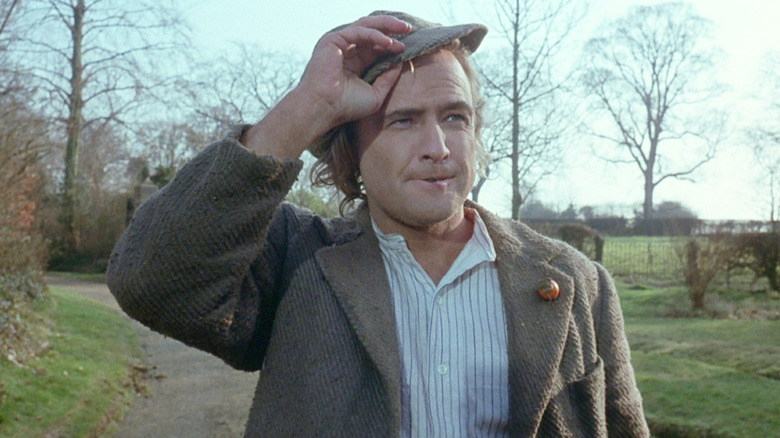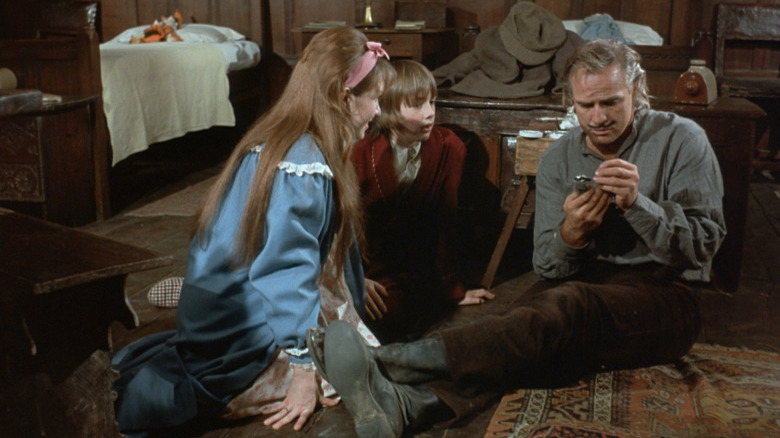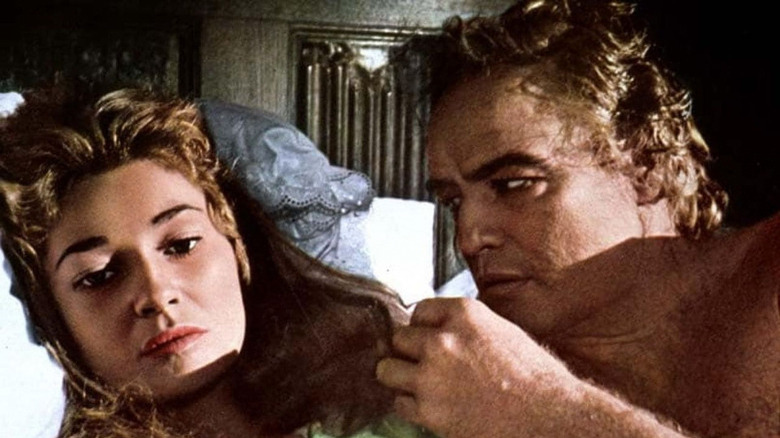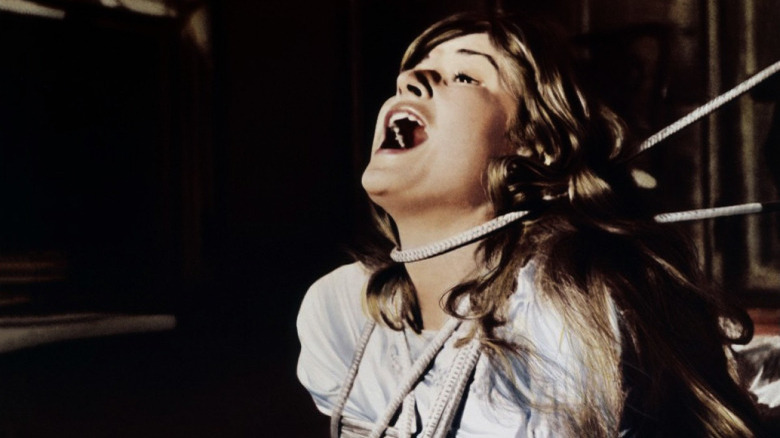
Mike Flanagan threw viewers a bit of a curveball with the second entry in his "Haunting" anthology series, 2020's "The Haunting of Bly Manor." Where the show's revered first outing, 2018's "The Haunting of Hill House," is horror through and through, its mostly well-received but slightly more divisive second entry is really a gothic romance that just happens to include literal ghosts. Yes, I'm using what you might call the "Crimson Peak" defense, but it applies here all the same.
Perhaps even more than "Hill House," "Bly Manor" plays fast and loose with its source material. Mainly a retelling of Henry James' classic 1898 gothic horror novella "The Turn of the Screw," the series adds elements from James' other works while also filling in the gaps in the romance between doomed lovers Peter Quint and Miss Jessel prior to the story's events. Interestingly, though, it wasn't the first off-shoot of James' novella to do this.
Nearly 50 years before Flanagan's show, director Michael Winner made "The Nightcomers," a "Turn of the Screw" prequel film that reveals what really went on between Peter (played by Marlon Brando) and Miss Jessel (Stephanie Beacham). But just as fascinating as the ways "Bly Manor" and "The Nightcomers" differ in their reading of the subtext of James' source book is the way Brando tried to use the movie to revitalize his then-faltering career when it came out in 1971.
Bly Manor Vs. The Nightcomers

In "Bly Manor," Peter (Oliver Jackson-Cohen) is an executive assistant to Henry Wingrave (Henry Thomas), a businessman whose young niece and nephew, Flora (Amelie Bea Smith) and Miles (Benjamin Evan Ainsworth), reside at Bly Manor in the wake of their parents' death in the 1980s. Being a very busy business fellow with lots of business things to do (or so he tells everyone), Henry entrusts Peter with the task of watching his wards.
At first, Peter feigns confidence, charming the orphans and sweeping their caretaker, Miss Jessel (Tahirah Sharif), off her feet. But before long, their relationship turns toxic thanks to Peter, who is quick to become jealous and grows ever-more controlling towards Miss Jessel. Their unhealthy romance reaches its terrible climax when Peter, having been killed by an old specter at Bly Manor, convinces Miss Jessel to allow him to possess her as a ghost, only to make her drown herself against her will.
Unlike "Bly Manor," "The Nightcomers" is a direct prequel to James' novella, with Peter and Miss Jessel serving as, in turn, a gardener and governess at Bly Manor in the movie's period setting. It also takes Peter's romance with Miss Jessel a step further, portraying Peter as a charismatic, well-traveled individual with a twisted side. In his 2008 book, "Somebody: The Reckless Life and Remarkable Career of Marlon Brando," Stefan Kanfer aptly describes Peter and Miss Jessel's relationship in the film as a "sadomasochistic affair" complete with bondage.
In an even darker twist, the movie has Flora (Verna Harvey) and Miles (Christopher Ellis) secretly observing and even trying to recreate Peter and Miss Jessel's violent encounters, culminating in the orphans murdering the couple so they can stay together after their trysts put their jobs in danger. Kids be rascals, amirite?
Brando Needed A Comeback

Heading into "The Nightcomers," Brando was going through a rough patch in his career. Indeed, there's a good reason why, when film buffs talk about Brando being at the height of his powers as an actor, they tend to focus on his movies from the 1950s and '70s while mostly ignoring his '60s output.
After racking up Oscars nods for his roles in "A Streetcar Named Desire," "Viva Zapata!," "Julius Caesar," "On the Waterfront," and "Sayonara" (winning for "On the Waterfront"), Brando spent most of the '60s in a dry spell, so far as the critical and financial success of his films goes. "Who was it called the sixties 'a slum of a decade?' Well, these were a big part of the big dump," as Kanfer puts it flippantly in his book. He adds:
Why did [Brando] make them all? It was hard to remember sometimes. A combination of debt, women, kids, and on the rare occasions a belief in the material.
According to Kanfer, Brando saw "The Nightcomers" as a chance to refute the reputation he had earned over the decades prior for being egotistical, discourteous to his co-workers, and more or less content to coast by on his early acting accomplishments:
Marlon approached his character with care, not least because he wanted the [news] to get around: Brando is behaving himself. Brando knows his lines cold. Brando can do an Irish accent. Brando is not causing delays.
Brando even insisted on taking his meals with the crew of "The Nightcomers," not wanting to give off the impression he thought he was above them. When Winner assured him the crew would be more relaxed eating without "the overpowering presence of their employers and a major star," Marlon ate in his dressing room and trailer instead.
Meet The New Brando, Same As The Old One

At first, Brando got top marks for his behavior during filming on "The Nightcomers." Beacham referred to him as an "amazing talent" in her diary and, in the early going, was often spotted laughing with him in-between takes. Beacham even seemed okay with Brando after he played a rather mean-spirited prank on her:
"We had a scene where he tied me to the bed posts with ropes. Suddenly, the bell to break for lunch rang. Marlon got up, and without saying a word, marched off to his dressing room. I tried to untie myself. I tried and tried, but I couldn't get those knots undone. I couldn't believe it. He had been able to do it so easily. Then some of the crew came to my rescue, but they couldn't untie me either! Finally, someone called Brando who, very calmly, came back to the set and proceeded to untie me with the greatest of ease."
Although Winner (naturally) spoke highly of Brando while promoting the movie, the two were seen clashing as shooting went on. Brando also began to do things like grabbing Beacham without her permission and referring to Winner, who was Jewish, as "Men Führer" in an effort to offend them. As Kanfer put it, the film's crew would watch Brando "veer in a single day – sometimes in a single hour – from ennui to euphoria, from a total rejection of his profession to an artful performance that moved fellow performers to tears."
In the end, "The Nightcomers" was not the hit Brando hoped for (hence its lesser-known status today). That would finally come a year later with "The Godfather," by which point Brando had essentially returned to his former ways — being a real-life Peter Quint, if you will.
Read this next: 14 Horror Movie Flops That Became Cult Classics
The post Before The Haunting Of Bly Manor, There Was Marlon Brando's The Nightcomers appeared first on /Film.
0 Commentaires